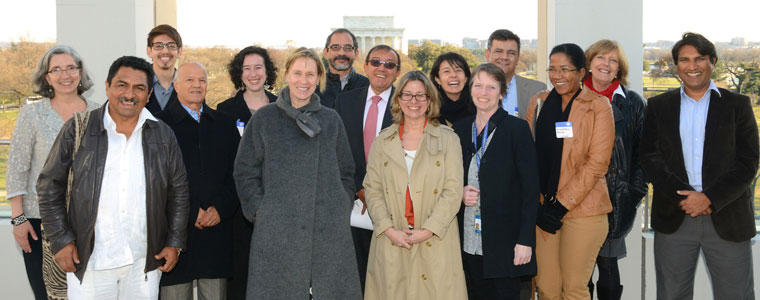Colombia: Land and the Agenda for Peace
On April 3, 2013, this event provided a platform for discussion on the relationship between land and the peace agenda among a variety of stakeholders from the U.S. and Colombian governments, victims and affected parties, academics, international organizations, and NGOs.

This violence has displaced five million Colombians, forced the evacuation of an estimated 20 million hectares of land, and produced a “reverse agrarian reform” that consolidates one of the most inequitable land tenure systems in the world. What proposals are being developed to address these land inequities, to restitute the victims of Colombia’s internal armed conflict, and to build sustainable peace?
On April 3, 2013, this event provided a platform for discussion on the relationship between land and the peace agenda among a variety of stakeholders from the U.S. and Colombian governments, victims and affected parties, academics, international organizations, and NGOs. This event was co-sponsored by the United States Institute of Peace and the U.S. Office on Colombia, with the support of U.S. Agency for International Development, U.N. Development Program, Latin America Working Group Education Fund, Mercy Corps, Inter-American Foundation, and Lutheran World Relief.
Colombia Peace Talks: Signs of Progress?
by Virginia Bouvier, program officer for Latin America in USIP’s Center of Innovation
Introductions
- David Smock, Welcome (Vice President, Centers of Innovation, U.S. Institute of Peace)
- Dana Brown, Introductions (Executive Director, U.S. Office on Colombia)
- Virginia M. Bouvier, Opening Remarks (Senior Program Officer for Latin America, U.S. Institute of Peace)
Speakers
- Absalón Machado
Rural Development Consultant, United Nations Development Program (PNUD), Colombia Academic coordinator,
Informe Nacional de Desarrollo Humano 2011 para Colombia (Rural Colombia: Reasons for Hope)
"El problema de tierras y la agenda de paz en Colombia" - Carlos Salgado
Director, Planeta Paz
"Por qué la paz pasa por lo rural" - Ricardo Sabogal
Director, Unit for the Restitution of Lands/Unidad de Restitución de Tierras
Unidad de Restitución de Tierras" (Presentation can be seen in the webcast). - Ángela Suárez Álvarez
Program Manager, Victims Institutional Strengthening Program (VISP),
USAID/Colombia
Apoyo de USAID a la implementación de la Ley de Víctimas y Restitución de Tierras" - Zoraida Castillo
Director, Lutheran World Relief,
Colombia
Retos en la implementación de la Ley de Víctimas y de Restitución de Tierras y propuestas para acciones futuras" - Yamilé Salinas
Independent researcher and specialist in land rights - Donny Meertens
Professor, National University and Javeriana University
"Transforming Gender Inequalities in Land Restitution: What are the Issues:? Notes for a Peace Agenda" - Everyldis Córdoba Borja
Coordinator, COCOMASUR (Community Council of Afro-Colombian Communities of the River Tolo)
"Cocomasur y la mediación comunitaria" - Luis Ernesto Vargas Silva
Magistrate, Constitutional Court of Colombia
"Colombian Government Duties towards Ethnic Minorities in the Context of the Restitution of Land Rights and the Peace Process"
Additional Presentation
- "Tejiendo minga por la paz, defensa y protección de nuestros territorios. Una apuesta estratégica desde el movimiento indígena colombiana" -- Jaime Enrique Arias (Governor, Indigenous reservation of the Kankuamo Indians and representative of the Organización Nacional de los Indígenas de Colombia/ONIC).



